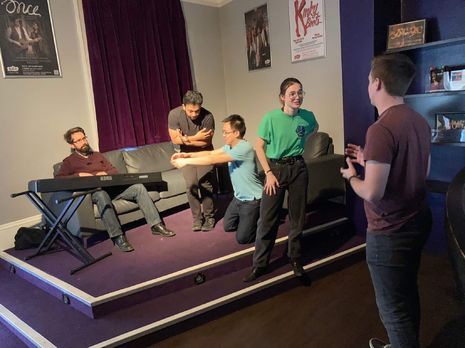Fast-paced fun in Impronauts: Quickfire!
A night of rapid-fire comedy and sharp crowdwork delivered by the Cambridge Impronauts

Improvisation is a deadly game. The onus is on each performer, at each and every possible instance, to eke some laughter out of the cut and thrust of the moment. Not only this, but they are beholden to the suggestions of the audience as much as they are to their own skills, forced not only to entertain the crowd but to wrangle them as well. The Cambridge Impronauts, in this edition of Quickfire, pulled off this corralling fairly admirably.
The show started off with some extremely smooth crowd warm up. Whereas most theatre frowns upon the boozed-up spectator shouting from the back, in this format all such disruptions are viewed as generative. If anything, there could have been a little more riotousness on the part of the audience, who were a tad restrained in the beginning. Strange to criticise the audience as part of the show, but in this format, they are as vital a part as anything.
“All these sorts of jokes rely on rhythm, that ineffable substance of so much comedy”
We soon moved into the various improvisation games of which the show consisted, starting with more basic duologue scenarios, then moving into all sorts of miming games, guessing games, wordplay games, and so on. Each of these games also involved one performer as the scenario maestro, who dictated when to switch a reaction, or a scenario, or go to another prompt. The maestro’s position in the show is vital, dictating the rhythm of the show and managing to produce some of the biggest laughs. A shining example was in the debate game, wherein two people must construct a sentence through alternating words, neither knowing what is coming next. In this scenario, the sentence as constructed was “people who eat soup don’t”. One of the performers then added the word “love”– in the transitive sense – and then, after a brief pause, the maestro cut to the other team, thus wrapping up their sentence as an intransitive. Cue laughter. Cue tears of joy. All these sorts of jokes rely on rhythm, that ineffable substance of so much comedy, and therefore on a natural understanding and chemistry between the performers, which was there for most of the show.
There were also moments of sheer stone-faced bathos that yoked some of the biggest laughs out of the audience. I love these understated moments of pure stupidity, and such moments happily abounded. There was also some lovely utilisation of understated nonsense, such as when one character claims that he cannot be the murderer because he is not wearing the murderer’s coat. In a format which can sometimes inspire strained attempts at making the absurd logical, it really is nice to enjoy absurdity neat with no mixer.
“It really is nice to enjoy absurdity neat with no mixer”
Slightly disappointingly, few of the scenarios really developed beyond the original thrust or conceit. Although improv is about getting jokes out there, it is also about taking a situation and elevating it, establishing traits and relationships among the characters and then mining those for material. But the performers were sometimes too greedy for constant laughs to relax and develop the scenario. There were one or two exceptions to this where the scenarios were developed, such as a scene which built up from a routine cooking show scenario into the breakup of a marriage on live television. A relationship was established, developed and ended all within the space of five minutes, taking the original prompt as a jumping off point for an exciting improvised narrative. Other scenarios, however, never seemed to develop much past the initial prompt. The cast seemed more at ease with the more rigorously structured games which force invention out of necessity, such as the debate game already mentioned. In such a game characters don’t need to be constructed, and comedic surprise can unfold without having to be concerned by the development of a scene.
It’s worth mentioning that these scenarios are dictated by what the audience prompts, and we must extend some sympathy to anyone who is handed the prompt of “Scandi Noir” when they haven’t really consumed any such material. What can they then go for? Darkness? Trees? The material is limited. In these situations, the maestro really can be the lifesaver. A few times the audience would come out with a few disparate, uninspiring prompts, only for said maestro to combine one or two of them together to forge something unexpected. It’s like watching some extempore alchemical process in which the audience is being saved from itself.
Crucially, there was a heap of silly fun to be had during this hour with the Impronauts. It is proof – although there are many easy jokes to be had about improv troupes – that when done well it can be an incredibly exciting form of comedy. It is pure invention flying by at speed and stands for a solid hour of entertainment. What more could be said in praise of this kind of show?
 News / Judge Business School advisor resigns over Epstein and Andrew links18 February 2026
News / Judge Business School advisor resigns over Epstein and Andrew links18 February 2026 News / Gov grants £36m to Cambridge supercomputer17 February 2026
News / Gov grants £36m to Cambridge supercomputer17 February 2026 News / Hundreds of Cambridge academics demand vote on fate of vet course20 February 2026
News / Hundreds of Cambridge academics demand vote on fate of vet course20 February 2026 News / CUCA members attend Reform rally in London20 February 2026
News / CUCA members attend Reform rally in London20 February 2026 News / Union speakers condemn ‘hateful’ Katie Hopkins speech14 February 2026
News / Union speakers condemn ‘hateful’ Katie Hopkins speech14 February 2026










